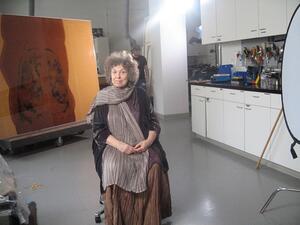Opening of "Too Jewish?" exhibit featuring work of artist Helène Aylon
Courtesy of Peter Samis.
Helène Aylon's The Liberation of G-d was first shown in the New York Jewish Museum's Too Jewish?: Challenging Traditional Identities exhibit, which opened on March 10, 1996. The work, which took six years to create, was made by covering every page of the five books of the Torah with transparent parchment, on which Aylon marked problematic passages with a pink pen. The marked passages were mostly those considered degrading to women, but also included negative references to homosexuality. This work was accompanied by commentary on the marked passages from a spectrum of Jewish scholars and rabbis. Liberation was typical of Aylon's work in combining Jewish and social justice themes.
Born in 1931, Aylon was raised in Borough Park, Brooklyn, and married young. It was only when her husband, a rabbi, died of cancer in 1961 that she began to paint. At the same time, she changed her name (from Fisch) and turned away from Judaism. Her first works were abstract paintings made by pouring linseed oil onto plexiglass. Later, she turned from painting to sculpture, creating installations and performances. In the 1980s, her work increasingly commented on issues of social justice and world peace. The 1985 Current, two sacs en route consisted of small sacs of seeds floating down Japanese rivers toward Hiroshima and Nagasaki to mark the 40th anniversary of the nuclear bombings of those cities. The piece was videotaped, and in 1995 was shown on the Sony Jumbotron in New York's Times Square. Another piece from the 1980s, The Earth Ambulance, featured pillowcases filled with earth "rescued" from nuclear weapons sites around the world.
In the 1990s, Aylon began to focus her work on Jewish themes. Like The Liberation of G-d, these works highlighted gender inequities in Judaism. My Notebooks (1998) suggested a 1950s Orthodox girls' school classroom, with empty notebooks covering the walls to symbolize the absence of women's voices in the traditional texts taught to girls like Aylon. My Bridal Chamber (2001) focused on the laws of niddah—the ritual impurity of women during menstruation—and mikveh (ritual bath). Not surprisingly, many of these works caused considerable controversy. Although a critic for Art in America called The Liberation of G-d "an incisive and elegant deconstruction of Jewish texts," some visitors to the Jewish Museum called it "absolute garbage" and "disgusting" in the Museum's comment book. Similarly, reactions to My Bridal Chamber ranged from angry to enthusiastic, with at least one visitor calling it "offensive" while the curator saw it as "very healthy" and affirming.
Undeterred by the controversy her work creates, Aylon continues to create pieces that call attention to injustice and sexism, particularly within Judaism. The Digital Liberation of G-d (2004), exhibited in San Francisco, recreated the original Liberation with the addition of an interactive computer terminal where viewers can read the passages Aylon highlighted and add their own comments. Aylon's works are in the permanent collections of The Jewish Museum, the San Francisco Jewish Community Center, and elsewhere. In 2002, she was awarded the National Foundation for Jewish Culture's Visual Arts Award.
To learn more about Helène Aylon, visit Jewish Women and the Feminist Revolution.
Sources: New York Times, 28 August 1992, 8 March 1996, 19 July 2001; Norman L. Kleeblatt, ed., Too Jewish?: Challenging Traditional Identities (New York, 1996).



